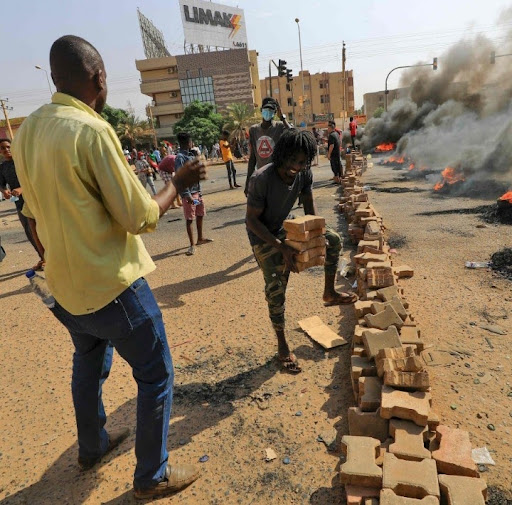#SudanCoup: Military Declares State Of Emergency, Dissolves Transitional Cabinet
Sudan has been experiencing political stalemates since gaining independence in 1965.

General Abdel Fattah al-Burhan, Sudan’s military officer heading the Transitional Sovereignty Council, announced a state of emergency across the country and the dissolution of the power-sharing ruling council on Monday, Oct. 25, following the arrest of Prime Minister Abdalla Hamdok and other civilian officials.
Hamdok was being detained in an undisclosed location after resisting to issue a “pro-coup statement,” the Sudanese Ministry of Information and Culture said in a statement on Facebook.
Tension turned sore within the Transitional Sovereignty Council, created after the 2019 ouster of longtime Sudanese military ruler, Omar Hassan al-Bashir, involving civilian and military leaders.
al-Burhan in a televised statement said the 2019 agreement on a transitional government had turned into a political crisis that now threatened the country’s peace and security.
Announcing the dissolution of the ruling council, he said the latest development was needed because the military had to protect the country’s safety and security as stated in the constitutional declaration.
“To rectify the revolution’s course, we have decided to declare a state of emergency nationwide … dissolve the transitional sovereign council, and dissolve the cabinet,” al-Burhan said.
He also announced that elections would be held in July 2023, adding that state governors had been stripped of their powers.
Earlier, the information ministry cited Hamdok calling on the Sudanese people to resist the coup attempt peacefully.
“We call on the Sudanese people to protest using all peaceful means possible… to take back their revolution from the thieves,” the ministry said.

AFP reported how thousands of protesters had already taken to the streets to denounce a coup.
Similarly, the international community had condemned the military’s move.
On Monday, Jeffrey Feltman, the United States Ambassador to Sudan, said the military takeover put the country at risk of losing the US assistance.
“This would contravene the Constitutional Declaration and the democratic aspirations of the Sudanese people and is utterly unacceptable,” Feltman said in a statement.
Robert Fairweather, the United Kingdom’s special envoy for Sudan and South Sudan, said the military arrests of civilian leaders was “a betrayal of the revolution, the transition, and the Sudanese people.”
Since gaining independence in 1965, Sudan has witnessed several coups, resulting in political stalemates.
Support Our Journalism
There are millions of ordinary people affected by conflict in Africa whose stories are missing in the mainstream media. HumAngle is determined to tell those challenging and under-reported stories, hoping that the people impacted by these conflicts will find the safety and security they deserve.
To ensure that we continue to provide public service coverage, we have a small favour to ask you. We want you to be part of our journalistic endeavour by contributing a token to us.
Your donation will further promote a robust, free, and independent media.
Donate HereStay Closer To The Stories That Matter




